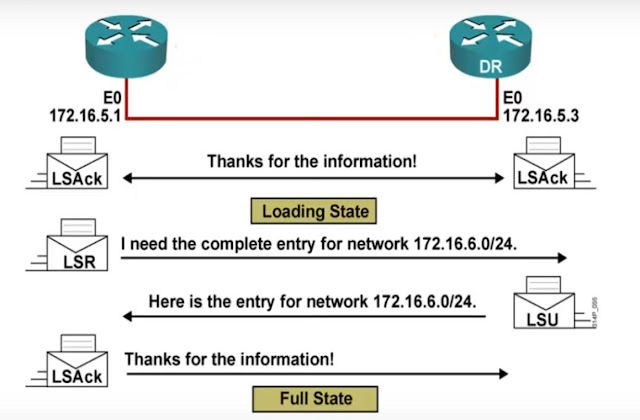OSPF ++++++++++++++++++++++++++++++++++++++++++++++++++++++++++++.
- .Standard protocol.
- .It link State protocol.
- .Unlimited hop count.
- .Using Metric to calculate the B.W (cost=10^8/B.W)
- .Administrative distance is 110.
- .It is a classless routing protocol.
- .It supports VLSM and CIDR.
- .It support only equal-cost load Balancing.
+++++++++++++++++++++++++++++++++++++++++++++++++++++++++++++
- Updates are sent to multicast address 224.0.0.5
- Faster convergence.
- Send Hello packet every 10 second & Dead = 40 sec
- incremental updates
+++++++++++++++++++++++++++++++++++++++++++++++++++++++++++++
7 stages process
- 1 Downstate
- 2 Attempt/Init state (exchange hello mess)
- 3 Two ways state (neighbors relationship )
- 4 Exstart state (not exstart decide to exchange )
- 5 Exchange state
- 6 Loading state
- 7 Full state
using the command it will send hello mess with a multicast address 244.0.0.5 and the router-id same thing with route b when router b try to advertise their interface using the command
router b will send back with Hello mess with the unicast address and the own Router ID, by the way, this is initially State. After that will exchange their router-id and be become neighbors relationship
Using Show IP OSPF neighbors
Neighbor ID Pri State Dead Time Address Interface 1.1.1.1 1 FULL/DR 00:00:31 172.16.5.1 FastEthernet0/0
Router# show IP protocols
Routing Protocol is "OSPF 1"
Outgoing update filter list for all interfaces is not set
Incoming update filter list for all interfaces is not set
Router ID 2.2.2.2
Number of areas in this router is 1. 1 normal 0 stub 0 nssa
Maximum path: 4
Routing for Networks:
172.16.5.2 0.0.0.0 area 0
2.2.2.2 0.0.0.0 area 0
Routing Information Sources:
Gateway Distance Last Update 1.1.1.1 110 00:08:21
2.2.2.2 110 00:07:54
Distance: (default is 110)
Router#show IP OSPF database OSPF Router with ID (2.2.2.2) (Process ID 1) Router Link States (Area 0) Link ID ADV Router Age Seq# Checksum Link count 1.1.1.1 1.1.1.1 615 0x80000003 0x006d43 2 2.2.2.2 2.2.2.2 588 0x80000003 0x007b28 2 Net Link States (Area 0) Link ID ADV Router Age Seq# Checksum 172.16.5.1 1.1.1.1 615 0x80000001 0x00a2a9Router ID
In Exstart Sate they not exchange the DBD information they decide to Exchange the route with higher router id address will start to exchange is first.
DBD is a summary of The LSDB is a database of all OSPF router
OSPF must have the same database
In the loading states, the router A will check to compare to make sure that they have the same database from a neighbor if there an extra network they will send LSR request LSR stand for (Link Sate Request ) and after they will receive that Database
LSACk and complete full State
Problem: OSPF full neighborship is not coming up between routersCause :
1. Hello, and Dead timer or Area ID, Authentication password/type/key or Area type are mismatches between router.
2. Trying to build OSPF neighborship on the secondary address.
4. OSPF not enabled on the correct interface or network command is wrong.
5. Network type is NBMA and no neighbor map configured with a broadcast option.
6. High CPU or OSPF packet is dropped by interface due to queuing or high rate or hardware issue from an interface to CPU path.
7. Mismatch Subnet mask is configured.
8. "passive interface <> " is configured under "router OSPF" for the interface.
9. Mismatch Network type is configured.
10. The router is configured with IP OSPF priority 0 on the router.
11. Neighborship is getting built over the virtual link on a stub area.
OSPF Troubleshooting commands
Show IP OSPF neighbor
show Ip OSPF neighbor detail
show Ip OSPF
show Ip OSPF database
show Ip OSPF interface
show Ip OSPF database database-summary
show Ip OSPF virtual link
show Ip OSPF database self-originate.
show Ip OSPF database adv-router
show Ip OSPF statistics
show Ip OSPF request-list
show Ip OSPF bad
debug Ip OSPF adj
debug IP OSPF monitor
show Ip OSPF request-list
show Ip OSPF bad
debug Ip OSPF adj
debug IP OSPF monitor




No comments:
Post a Comment